Online Healthcare Advertising
Table of Contents
80% of Americans—or 93 million people—have searched for health-related information online. These searches range from looking up a certain health condition to Googling various treatments.
With more people searching for health information through Google, the healthcare industry has become more competitive than ever.
As the owner of a small healthcare practice, you understand how challenging advertising is when you’re going up against big-name competitors in your industry.
To overcome this challenge, you need a uniquely crafted campaign for your healthcare marketing ads. The goal of this campaign is to gain more visibility with potential patients for your practice.
Before you get started, though, there are two main factors you need to keep in mind.
When using Google Ads, there are strict healthcare and medication guidelines your advertising must follow. Google restricts advertising for online pharmacies—meaning they can’t use Google ads to promote their business.
Other restrictions include prescription drugs and active ingredient names that Google does not allow in ad copies.
If you ignore these regulations, you might end up receiving a policy violation.
Another critical factor to assess is cost. Thanks to the abundance of online health information, patients have a lot of choices, which makes advertising more expensive.
The average cost your practice pays is $12-$15 per click for a healthcare keyword. Assuming a conversion rate of 2%—meaning 2 out of every 100 visitors to your site become a new patient—you’ll pay around $600—$750 to gain a new patient.
By now, you might feel ready to check out healthcare advertising alternatives. If so, you can skip to that section, or head over to our Healthcare SEO page.
Otherwise, continue reading to check out some Google ads, Facebook ads, healthcare keywords to target, and their costs.
Examples of Healthcare Google Ads
If you want to create the best healthcare ads, then your aim should be to create ads that lead to conversions. Often, a conversion can be traced back to successful Google Ads.
What makes Google Ads successful for healthcare practices? Remember how many people are now searching for health information online. When those potential patients make that search, Google Ads put your services in front of them when they need them the most.
Below are several examples of healthcare Google Ads, along with an explanation of why they work.

Why this ad works: Accessibility and convenience are big sellers for many, so it is no wonder that telehealth services are on the rise. By featuring those services, this ad makes a great offer to those in need of a nearby doctor.
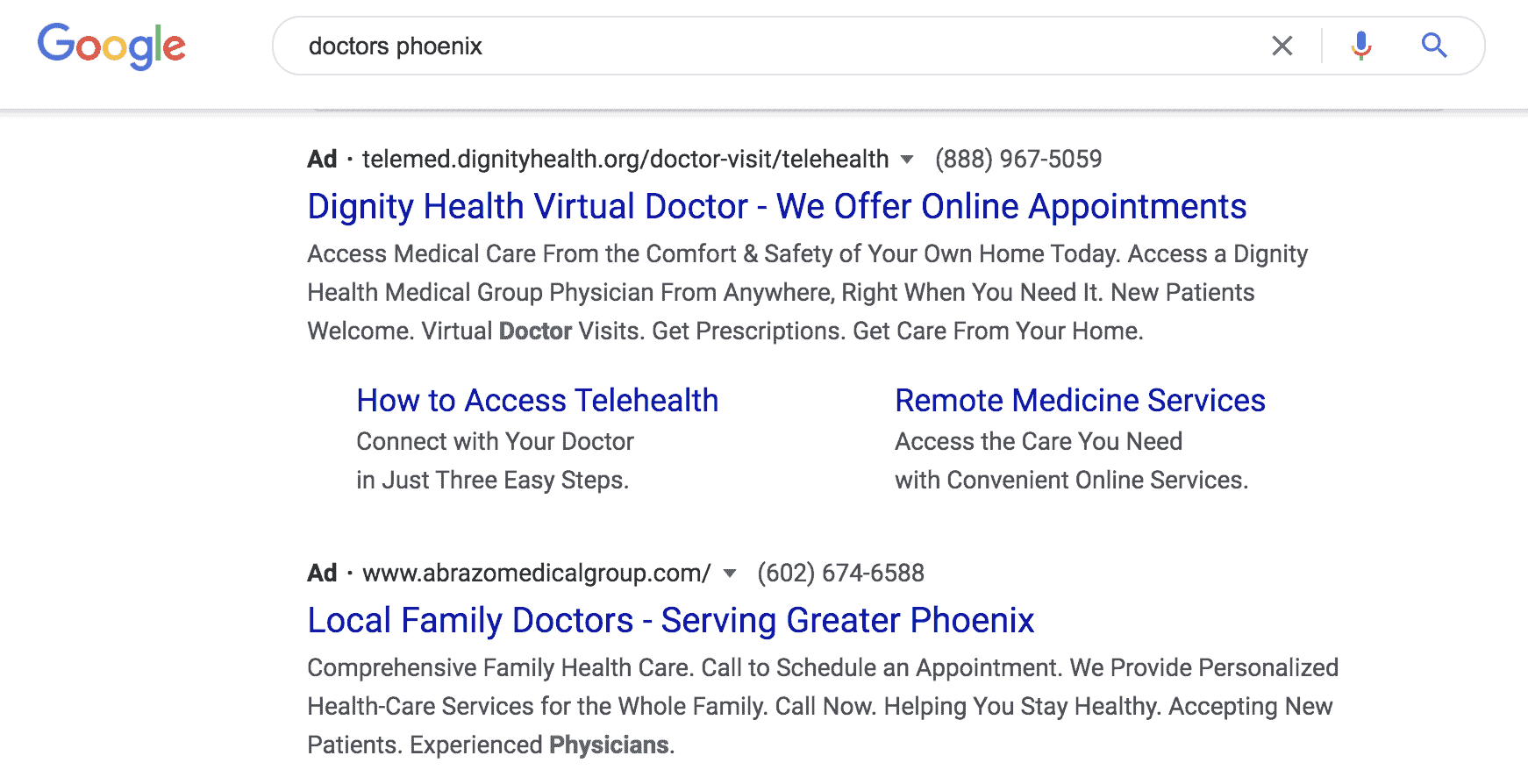
Which ad would you choose?: When looking for a doctor near me in Phoenix, these two ads show up. Depending on what I’m looking for, either ad may sway me more than the other. If I’m more interested in remote medical services, the first ad may be more persuasive. However, I am searching for a doctor that I can see locally for personalized care, so the second ad is the more attractive of the two.

Why this ad works: Longevity is a plus when it comes to ad copies–especially for family doctors. By putting that they have been board certified since 1979, this practice makes it clear they’ve got years of experience behind their services.
How Much Do Healthcare Keywords Cost on Google Ads?
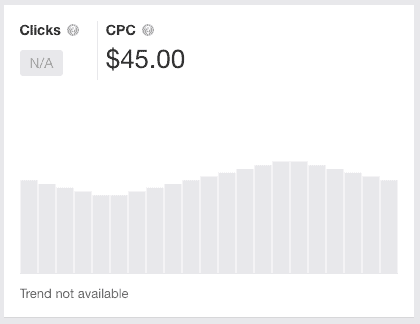 Here, we’ve put together a list of 10 of the top healthcare keywords on Google Ads with their average cost per click:
Here, we’ve put together a list of 10 of the top healthcare keywords on Google Ads with their average cost per click:
- family doctor near me – $4.50 / click
- online doctor – $9.00 / click
- car injury doctors – $45.00 / click
- primary care physician – $6.00 / click
- what type of doctor treats lung cancer – $20.00 / click
- doctor appointment – $5.00 / click
- walk-in doctor near me – $7.00 / click
- cost of doctor visit without insurance – $12.00 / click
- where to find a doctor – $6.00 / click
- carpal tunnel doctor – $35.00 / click
While some healthcare keywords cost as little as $4.00, many keywords can cost anywhere from $12-$45 per click. In other words, you’d end up paying google that cost every time someone clicks on your ad.
Examples of Healthcare Facebook Ads
In addition to Google Ads, Facebook ads are a prominent form of paid advertising that some companies utilize.
Our first example below is a set of ads from an ophthalmologist—or eye doctor—that feature several treatments and services:

Why it works: Each of these ads targets a question that potential customers might be searching for. So, a customer who is experiencing symptoms such as light sensitivity might click on the first ad to learn more about their symptoms. Plus, providing helpful information to potential patients is a great way to connect with them.
Our next example shows a healthcare practice’s ad campaign targeting specific types of pain:
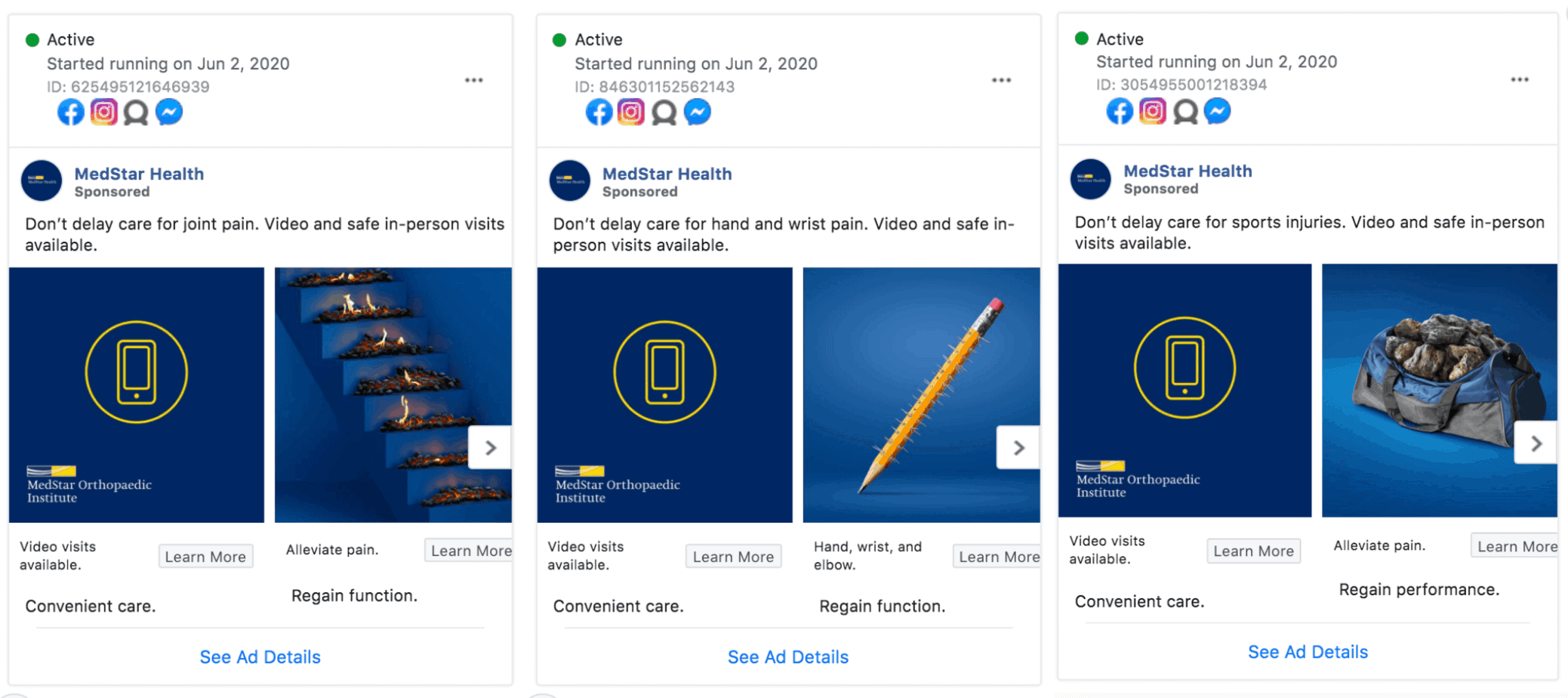
Why it works: These ads are all visually appealing and are consistent, which works well with building up a specific brand image. Additionally, these ads present the practice as accessible by offering telehealth visits along with in-person visits.
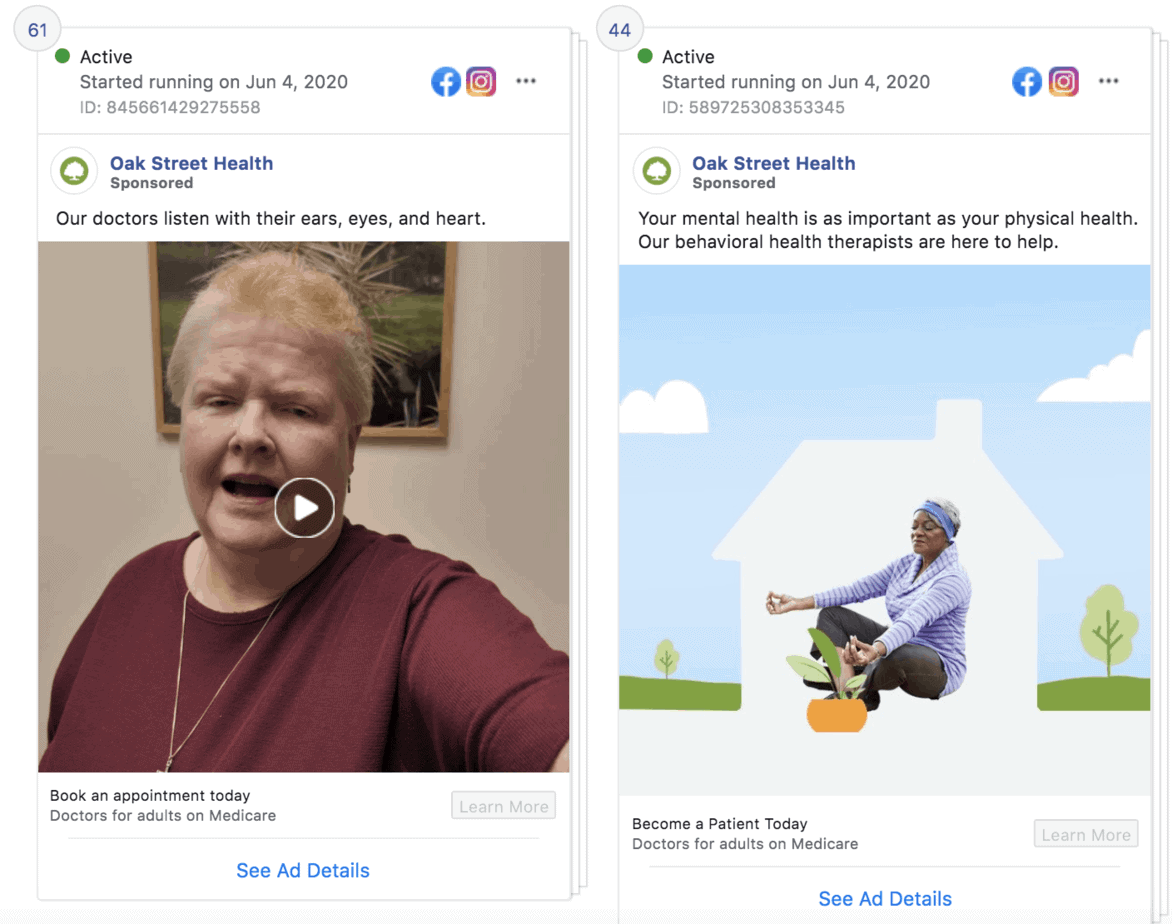
Why it works: Patients want to find a doctor who they feel comfortable with and can trust. Both of these ads address this need in different ways–with a video and a graphic–but they make it clear that this practice is compassionate when it comes to their patients.
Healthcare Advertising Alternatives: Search Engine Optimization (SEO)
How can utilizing SEO (search engine optimization) in your healthcare ads campaign help your practice? There are three main categories that you can benefit from with an SEO campaign. Known as the three C’s, these reasons are: Clicks, Costs, and Conversions.
Let’s take a look at the traffic that searching “family doctors near me” receives:
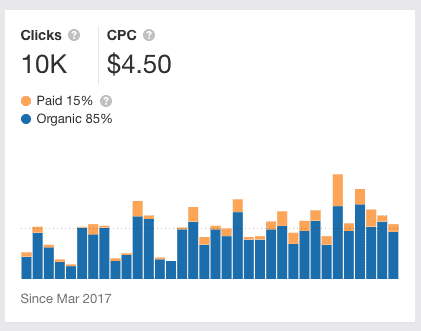
As you can see, an estimated 85% of traffic for this keyword goes towards organic results. That means that the remaining 15% of the search traffic for this keyword goes to sponsored results.
You’re likely wondering: why is there such a large gap between organic and sponsored traffic?
The answer is simple: a majority of people tend to trust organic results more often than they do sponsored results.
Sometimes, Google won’t show sponsored results for specific healthcare searches. For example, when I searched “general physician,” the first results Google showed were a list of practices near my location. Results like this are known as Local SEO results, where results relevant to your location are prioritized.
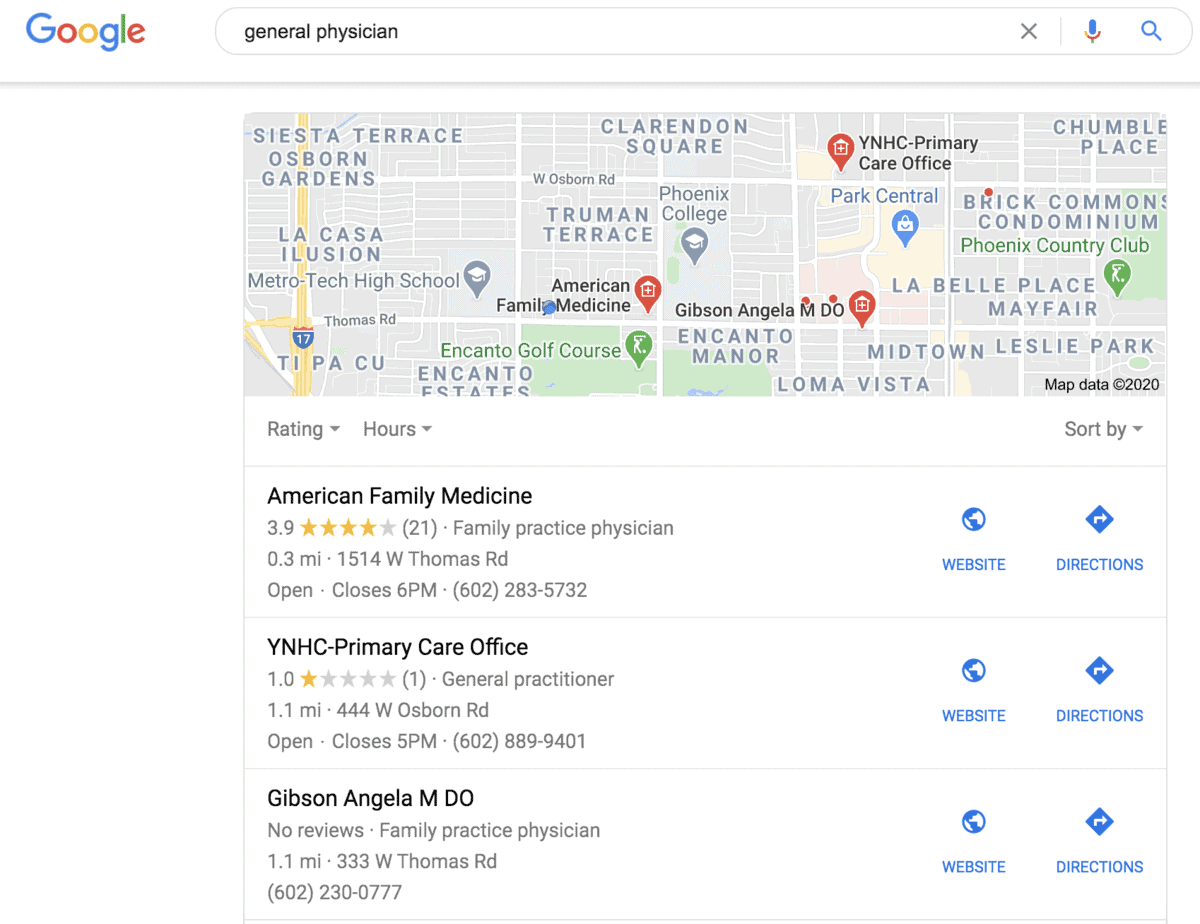
Thus, it’s clear that both Google and users put more trust in the organic results they see instead of paid ads.
Curious about how well your healthcare practice’s website is optimized for SEO? Conduct a free SEO audit to find out!
Another Alternative: Healthcare Directories
One alternative that healthcare practices can consider when advertising involves healthcare directories. These directories feature a variety of information on different practitioners and what services they offer.
Some examples of top directories to check out include WebMD’s Physician Directory or Healthgrades Doctor Directory. There, you can purchase a listing to feature your practice and attract new patients.
The Big Question: How Do Healthcare Professionals Engage With More Patients?
In the end, the overall goal for any successful healthcare ad campaign is to connect your practice with more patients. How you achieve that goal can differ.
Are Google Ads the best choice for my practice’s advertising? What about Facebook ads, or advertising in a doctor directory?
We might be biased, but we believe that the best strategy to achieve sustainable growth for a small business is through SEO.
If you want to learn more about how you can invest in long-term growth for your business while lowering your advertising costs, contact us to schedule a consultation.
First, we schedule a 15-minute call with you to connect and learn more about your business. Next, we conduct a free SEO audit on your website to learn about the site, identify any significant keywords, and learn about your major competitors.
Once this is done, we analyze this data and determine if working together makes sense for your business. If it does, we then propose one of our SEO solutions that can fit your business.
If you’re wondering about healthcare marketing strategies, then check out some engaging blog topics to get some inspiration for your own.







